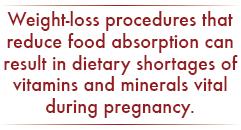Obesity, Weight Loss Surgery and Pregnancy
by Hugh M Ehrenberg, MD and Nikki Johnson
Many women dream of having healthy, successful pregnancies, but those who struggle with excess weight may feel their dreams of motherhood are out of reach. Becoming pregnant and carrying a healthy baby to term is a greater challenge for them because of social limitations, infertility and weight-related pregnancy complications. However, many overweight and obese women are becoming pregnant, in spite of the risks and difficulties. Recent data suggests that approximately 20 to 25 percent of pregnant women were overweight when they conceived, and an additional 20 to 25 percent of women were obese. The health risks associated with prolonged obesity are well established?high cholesterol and fatty acids, cardiovascular disease, gallbladder disease, blood clots, cancer, joint disease, infertility and diabetes. But what effect does obesity have on the mother and the fetus in a developing pregnancy?
The conditions that obese or overweight women may experience in pregnancy are becoming better and better documented. Among them are serious health-risks to mother and child, including diabetes, macrosomia (abnormally large babies), high blood pressure and preeclampsia, long labors, increased risk of cesarean delivery, shoulder dystocia broadened shoulders of the fetus stuck behind the pubic bone during delivery), cesarean incision breakdown and infection. It has been documented that there is an increased risk of fetal anomalies among overweight and obese women. It is also more difficult for healthcare providers to find fetal abnormalities during ultrasound on obese women because of the excess abdominal fat.
Many prospective mothers know the risks of obesity and pregnancy and attempt to lose the weight before pregnancy. However, between 50 to 80 percent of pregnancies overall in the United States are unplanned, and irregular menstruation makes it harder for obese women to determine when they are fertile and when they have conceived. The result is that women may not always have a chance to seek early help. The majority of obese women who conceive will not see a physician soon enough to safely lose weight before pregnancy, so medical intervention often comes during pregnancy, not before.
Pre-existing weight problems are not the only cause of risks for obese women; excessive weight gain during pregnancy also carries risks to the mother and the fetus, so seeking care as early as possible is absolutely critical. The good news for obese women who may find themselves pregnant is that even if medical attention is not obtained prior to pregnancy, there is usually ample opportunity during ongoing prenatal care to alter the weight-related pregnancy complication risks.
Overweight and obese women who seek obstetrical care may have a unique opportunity to receive weight-related treatment that they would not have had otherwise, because prenatal care requires frequent visits to physicians. While treatment during pregnancy generally focuses on reducing and managing the risks of obesity during pregnancy, the prenatal care period may also be a great opportunity for women to become better educated about the lifetime risks of obesity. This time of expectation and change may provide obese pregnant women a wonderful opportunity to begin modifying their diet and exercise in order to lower these risks for the duration of their lives.
Weight Management During Pregnancy
What approach to weight management is safe during pregnancy? How much weight, if any, should an obese woman gain? These questions are crucial, but the answers are not as straightforward as we may like them to be. Medical professionals do not agree about how much weight gain is ideal during pregnancy, especially for overweight women. The variance in opinion may be due in part to the scarcity of data on this issue. So, when expectant women who struggle with weight issues visit their obstetricians, the advice they receive varies; some doctors place limits on weight gain, while others recommend that no weight be gained at all.
While those of us in the medical community know a lot about the extent of the obesity epidemic and we have learned what obesity-related risks to expect during pregnancy, we don?t fully understand the effects and benefits of weight management during pregnancy. Certainly, the benefit to both mother and baby of losing weight before pregnancy are clear, but strict dieting during pregnancy may be very risky. Most weight-loss diets include an element of starvation. Studies of animals and a limited number of normal-weight women on ?crash? diets have shown an association between starvation-related weight loss and learning delays, such as spina bifida. It appears that high levels of ketones?the breakdown products of fats used for energy during starvation?may be associated with these risks. While studies of normal weight women may provide some useful direction, it is difficult to apply these findings to obese women who, with a bit of modification to their diets and increased exercise, may well lose weight or limit weight gain in pregnancy without overt starvation.
Although the American College of Obstetrics and Gynecology (ACOG) recommends that women gain 35 to 45 pounds during pregnancy, this recommendation applies to those women beginning pregnancy at or near ideal body weight. It is a mistake to believe that women who become pregnant when they are already overweight should gain the same amount. Weight that is gained during pregnancy is the result of the body accumulating fresh stores of fat. In women of normal weight, this increased fat creates a sort of pre-diabetic state (insulin resistance) to provide nutrients for the developing fetus. In women who are obese, these fat stores and the insulin-resistant state are already in place before pregnancy, so overweight women do not need to gain as much weight to nourish a fetus. The recommended gain of 35 to 45 pounds is therefore excessive, and should be avoided by following a proper diet during gestation. Updated ACOG recommendations have reduced the weight gain guidelines for women who conceive while overweight. Obese women should limit their weight gain during pregnancy to just 15 pounds.
Whether a physician suggests limited or no weight gain during pregnancy, one thing remains constant: proper diet and exercise, rather than limitation of caloric intake (starvation), is the way to accomplish weight-related goals. The advice of a registered dietician should be sought in order to avoid ketosis (the presence of ketones in the blood) while minimizing excess calories. The presence of ketones can be monitored easily and painlessly with urine test strips available in most pharmacies.
 Since weight gain or loss depends on a balance between calories eaten and calories burned, the role of exercise in pregnancy cannot be underestimated. Something as simple as walking stairs for a half an hour while holding the hand-rail will help the body use calories for fuel rather than depositing them to create new fat tissue. Women can wear an old pair of sneakers to walk back and forth in the shallow end of the local pool. Walking around the block after dinner is a good start, but since neighborhood walks depend on good weather, they will usually not be enough. The most effective exercise raises the heart rate to over 110 beats per minute for 30 minutes. Unless there is a medical or pregnancy-related reason not to exercise, this sort of exercise should take place at least three days per week. This physical activity will serve not only to avoid weight gain, but may help avoid complications such as the need for insulin in the treatment of gestational diabetes.
Since weight gain or loss depends on a balance between calories eaten and calories burned, the role of exercise in pregnancy cannot be underestimated. Something as simple as walking stairs for a half an hour while holding the hand-rail will help the body use calories for fuel rather than depositing them to create new fat tissue. Women can wear an old pair of sneakers to walk back and forth in the shallow end of the local pool. Walking around the block after dinner is a good start, but since neighborhood walks depend on good weather, they will usually not be enough. The most effective exercise raises the heart rate to over 110 beats per minute for 30 minutes. Unless there is a medical or pregnancy-related reason not to exercise, this sort of exercise should take place at least three days per week. This physical activity will serve not only to avoid weight gain, but may help avoid complications such as the need for insulin in the treatment of gestational diabetes.
Bariatric Surgery and Pregnancy
In recent years, the relationship between bariatric surgery and pregnancy has begun to evolve. While procedures that either shrink the size of the stomach or divert food around the more absorptive surfaces of the gut were initially thought to create increased risk of neural tube defects and abnormally small babies, it appears that the surgical weight loss methods used today are not only safe for subsequent pregnancy, but also may reduce the risk of some obesity-related pregnancy complications such as abnormally large babies and the need for cesarean deliveries.
| Maternal-Fetal Risks of Obesity in Pregnancy | ||
| Maternal | Fetal | Both Maternal and Fetal |
| Delayed or abnormal labor | Diabetes | |
| Cesarean delivery | Shoulder dystocia | Hypertension and preeclampsia |
| Post-operative complications | Childhood obesity | |
| Deep venous thrombosis/ pulmonary embolism | Birth defects (uncertain) | |
| Institutes of Medicine Pregnancy Weight Gain Recommendations | |
| Current Weight | Recommended Weight Gain |
| Normal Weight | 25-35 pounds |
| Overweight | 15-25 pounds |
| Obese | 15 pounds |
It is not as clear, however, what impact weight loss surgery may have on more serious complications in the obese, such as gestational diabetes and hypertension risk. Weight-loss procedures that reduce food absorption can result in dietary shortages of vitamins and minerals vital during pregnancy. Supplementation of vitamins B6 and B12, iron, folate and zinc are recommended. Again, close consultation with a registered dietician is a must for women conceiving after bariatric surgery to maintain healthy levels of vitamins and minerals and to avoid ketosis.
Since obesity often causes infertility, weight loss after bariatric surgery sometimes results in an unintended pregnancy, particularly in cases involving adjustable gastric banding. Current thought recommends avoiding pregnancy during the first 12 to 18 months after the surgery, during the period of the most rapid weight loss. Gastric banding patients may require adjustments during pregnancy due to the effects of the enlarging uterus on the body. In light of all these considerations, pregnancies after bariatric surgery should be considered ?at risk? and require careful management and early consultation with high-risk pregnancy specialists.
Dreams of motherhood do come true for many women?both obese women and those of normal weight. A commitment to healthy habits, safety and planning gives women and their babies the best chance for a safe pregnancy, uneventful delivery and long, healthy lives.
 Dr. Ehrenberg is an Assistant Professor in the Department of Reproductive Biology at Case Western Reserve School of Medicine in Cleveland, Ohio. He works in the Division of Maternal Fetal Medicine at Metro Health Medical Center and specializes in both fetal and maternal complications in pregnancy, with a focus on obesity.
Dr. Ehrenberg is an Assistant Professor in the Department of Reproductive Biology at Case Western Reserve School of Medicine in Cleveland, Ohio. He works in the Division of Maternal Fetal Medicine at Metro Health Medical Center and specializes in both fetal and maternal complications in pregnancy, with a focus on obesity.